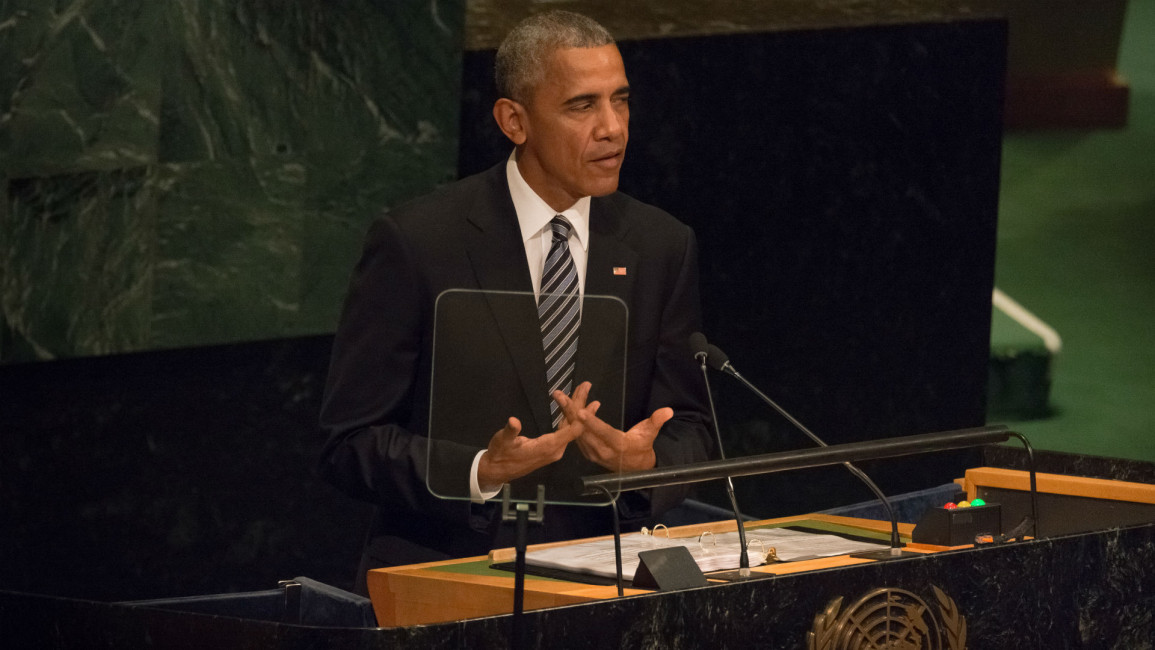
Washington's mixed messages on Palestine
Last week we witnessed a recurring sight; world leaders descended on New York to participate in the United Nations General Debate.
Israel/Palestine watchers like myself would be paying close attention to the words of Israeli and Palestinian leaders at the podium as well as any mention of the struggle by United States President Barack Obama, who was addressing the UNGA as President for the final time.
Events surrounding these speeches at the UN gave this round of podium lectures unique significance. Not only was President Obama, who had tried and failed like his predecessors to secure an Israeli-Palestinian accord, delivering his final General Debate speech, but he had just days earlier agreed with Israel on a historic military aid deal approximating $38 billion dollars over the next 10 years.
The aid deal was a highly anticipated agreement. It is important to keep in mind that such deals, which are Memorandums of Understanding (MOU) signed by the Israelis and Americans that outlined the flow of aid over a decade, are fixed on the calendars of US policymakers.
The Obama administration knew from its first days in the White House that the next MOU would be signed in 2016. This permanent fixture on the policy calendar impacted other areas of policy whether it was the peace process, arms to other Arab states or Iran deal negotiations.
While the headlines around the aid deal noted the historic nature of the agreement and the record sum involved, there was more to it than that.
Given the perception of a tenuous relationship between Netanyahu and Obama, the tension over the Iran deal, the partisan divide that grew during Obama's presidency and the importance of domestic politics, Obama administration decision makers likely aimed to make sure the aid deal would be the biggest ever.
 |
The meeting between Obama and Netanyahu went off without a hitch and was all smiles |  |
They did not want Obama to be known as the President who gave Israel less than his predecessors. But the details of the deal show that they did impose some changes in this once-in-a-decade assessment that will have lasting implications on the military aid relationship long after the Obama administration leaves Washington.
In the short term however, the optics matter most. President Obama and Israeli Prime Minister Netanyahu met on the sidelines of the UNGA. This meeting, the likes of which over the last eight years had routinely been followed by press speculation over the meaning of the cold body language between both leaders, went off without a hitch and was all smiles. "We’re friends", the images from the meeting said. So too did the aid deal.
But just days prior to the signing of the MOU, the Obama Administration through its state department spokesperson said the following:
"Let's be clear: The undisputed fact is that already this year, thousands of settlement units have been advanced for Israelis in the West Bank, illegal outposts and unauthorized settlement units have been retroactively legalized, more West Bank land has been seized for exclusive Israeli use, and there has been a dramatic escalation of demolitions resulting in over 700 Palestinian structures destroyed, displacing more than 1,000 Palestinians. As we’ve said many times before, this does raise real questions about Israel's long-term intentions in the West Bank."
Then, after handing an historic sum to the state committing all the above mentioned violations, President Obama said during his UNGA address that "Israel must recognize that it cannot permanently occupy and settle Palestinian land".
 |
the Israelis are getting the most important message in dollars and cents |  |
Here is a man who has previously said the "status quo is unsustainable" giving Israel a historic sum with which to sustain the very status quo he is now saying it must realise it cannot sustain.
If that sounds confusing, that is because it is.
But the Israelis are getting the most important message in dollars and cents and so long as the military aid pipeline is open, it is unlikely the Israelis will take any of the US's other messages seriously.
Secretary of State John Kerry also held a meeting with other ministers from states financing the Palestinian Authority, as part of the peace effort during the UNGA.
There he reportedly emphasised that Israel and the Palestinians are moving toward one-state and war, and that the international community had to take an urgent stand to prevent this. "Either we mean it and we act on it, or we should shut up", Kerry is reported to have said.
Perhaps there is an opportunity here for the United States to lead by example. Instead of shutting up, they can start by putting their money where their mouth is.
Dr. Yousef Munayyer is a Middle East Analyst at Arab Center Washington DC and Executive Director of US Campaign to End the Israeli Occupation
Follow him on Twitter: @YousefMunayyer
Opinions expressed in this article remain those of the author and do not necessarily represent those of The New Arab, its editorial board or staff.



